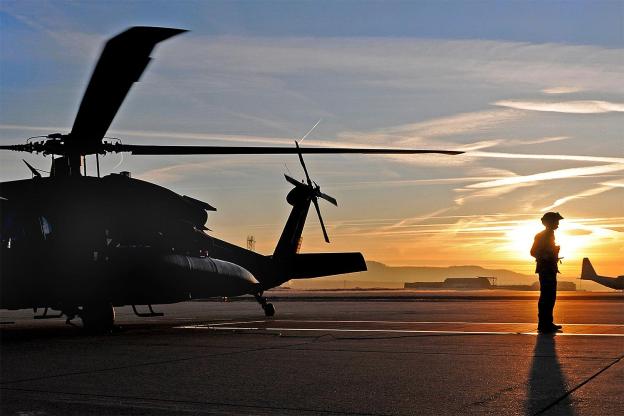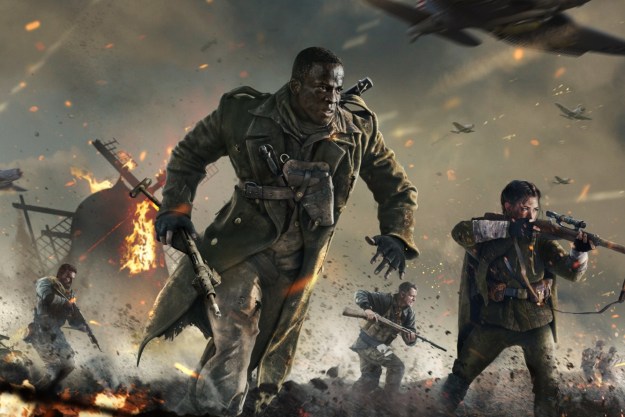
For better or worse, violence in videogames has remained a point of debate in mainstream media and national politics ever since the gaming industry became a widespread form of entertainment, and that is unlikely to change any time soon. It goes back decades. From the pixilated driving game Death Race, which was eventually removed from store shelves following a public outcry, to titles like Doom, which is seemingly quaint by today’s standards, there have been people claiming that gaming leads to violent behavior. Recently, the public’s attention has increasingly turned toward the massively popular military shooter genre.
“Using videogames for recruitment? 100-percent bullshit. 1000-percent bullshit.”
A connection between military shooters and real world violence is almost a given according to many, despite there being no real evidence to support that claim. It is a sad consequence of the prevalence of such tragedies in recent years, and it gives an easy answer to an almost impossibly difficult question. But beyond the scores of pundits, mental health experts, and outraged politicians, one group is mysteriously underrepresented in their opinions on the subject – soldiers. How do those who have actually seen combat feel about these simulations of their experiences? And how have their opinions on military shooters been altered by real-life combat?
Just Remember It’s Only A Game
As soon as Thierry turned 18, he enlisted in the Army. The move wasn’t popular with his French father, whose country of origin only ended the practice of conscription in 2001. But for Thierry, enlisting was the realization of a lifelong dream. The year was 1990, and the first Gulf War was just about to rear its head.

“That summer, Saddam invaded,” said Thierry. “People were asking me if I was still going to go through with it, if I was going over to the war. I joined to fight, so of course I went.”
Thierry served with a mechanized infantry unit, eventually moving to the position of Bradley gunner during his eight-year stint with the U.S. Army. Video games were a longtime passion for Thierry, with his love for the medium stretching “all the way back to Pong.” After he returned from Operation Desert Storm, Thierry became acquainted with the still fledgling first-person, military shooter genre.
“I use those games as – well, to blow off steam,” Thierry said. “And no, that doesn’t mean I’m going to go walking down the street with my rifle and start shooting civilians. I understand it’s a game, and I think it all has to do with mental capacity. A game can be super violent, but the fact that it’s a military game has nothing to do with it. Whether the enemy is in a uniform, or an alien, it’s all still violence. But it’s also still just a game.”

“I think [military shooters] could even be seen as a recruitment tool, like these kids are thinking, ‘Yeah, I want to go kill terrorists, kill the bad guys,'” said Thierry. “But no amount of gaming will prepare you for what you’re walking into. At the end of the day, it all boils down to parenting, and making a clear line between reality and something that’s just a game. I think it’s absurd people blame videogames for kids taking guns to school; that’s just bad parenting.”
War Never Changes, But The Soldiers Do
Not every soldier comes home from war with the upbeat, well-adjusted demeanor shown by Thierry. According to some reports, as many as 30-percent of soldiers treated at V.A. hospitals after returning from the conflicts in Iraq and Afghanistan are diagnosed with Post-Traumatic Stress Disorder. The realities and horrors of combat can have lasting effects on veterans, affecting their ability to function normally in public settings and enjoy some of the basic pleasures they may have loved prior to entering the service. For one such veteran, tours in the ongoing wars in the Middle East have robbed him of the ability to play military shooters.
“Bob” (actual name withheld at his request) joined the Air Force for what he calls an almost cliché, albeit wholly genuine, reason: he really “wanted to do right” by his country. After the events of September 11, and feeling like America’s actions in Afghanistan were just, Bob decided to enlist. Plus, a stint in the service was a great way to pay for college. Even before joining the Air Force, though, Bob was an avid gamer with a deep love for first-person shooters.

“You know, anything that remotely touched tactics, like the Call of Duty games, shit like that. I thought they were a hoot,” Bob recalled. “Anything where I could pick up a gun and shoot somebody, I was all about it. I just thought it was fun; I didn’t put a lot of thought into it.”
Despite the allure of the action-heavy, fantasy scenarios that play out in first-person shooters, Bob is opposed to using the games to recruit young men and women. According to him, while the military does use advanced simulators to attract people in recruitment centers, they’re a big departure from the gameplay found in Call of Duty.
“Using videogames for recruitment? 100-percent bullshit. 1000-percent bullshit,” said Bob. “There are some recruitment stations where they’ve got big time simulations set up. Four walls with projections, you’re on a pretend jeep in combat. And it never crosses these kids’ minds that it’s not 110 degrees in there. You don’t smell it. When your buddy gets shot, he doesn’t scream the same way in a video game, you know?”
“If the parents are involved, I don’t see it as being an issue … If there’s someone there to put it all in perspective, to tell them it’s just a make believe game.”
“I’m using ‘contractor’ in the kindest possible term of the word,” said Bob. “They’re fucking mercenaries. They do what they do for a paycheck, and that was always kind of a sore point.”
As is the case all too often in war, those missions didn’t always go as planned. During his first tour, Bob almost immediately suffered a loss, which would haunt him years after returning back home.
“I lost a buddy the first time out,” Bob said. “When you join the military, you do so with the understanding part of your job is to kill people, break things, or to be in direct support of that. And if that’s your job, it’s also the enemy’s job. I got lucky and came back with all my pieces, a lot of guys didn’t.
“When you hear somebody screaming, and all you can smell is copper and shit… videogames are different afterward, at least to me. When I got back, I was diagnosed with PTSD, but looking back on it, I think it started earlier for me.”
Bob has attempted to play military shooters in the years since returning from the war, but as of yet he’s been unable to last very long without walking away. He can still play some shooter games like Halo for instance, as long as the titles are focused on, “aliens and space guns, or whatever.” Watching realistic military films also causes problems. Still, despite his aversion to the games he once enjoyed, Bob thinks military shooters are perfectly fine – assuming young people are receiving the correct guidance.

“If the parents are involved, I don’t see it as being an issue,” Bob claimed. “If there’s someone there to put it all in perspective, to tell them it’s just a make believe game. If there’s no one there, I think it could be a real threat.”
Someday, Bob is hopeful he’ll be able to overcome his condition and go back to playing military shooters. More than anything, he doesn’t want to feel like his condition has “that much control” over his life. But what about the even younger men and women who are still enlisted in active duty, still fighting in America’s wars? According to two soldiers, military shooters can actually steer young people in the right direction, more so than other videogame genres.
A Positive Outlook (Unless It’s GTA)
Three years ago, Steve enlisted with the Army, fully aware of America’s combat situations in the Middle East. While neither Steve nor his friend, fellow serviceman Tim, are obsessed with military shooters – Steve insists he has always “sucked at them” – they’ve both spent a decent amount of time playing games in the genre, both before and during their service.
“People like [gunman Adam Lanza], if they have that in their heart, they’re going to do that anyway, it’s not because of Call of Duty.”
Neither Steve or Tim think the accusation that military shooters influence young people to commit heinous acts, like those perpetrated in Newtown, hold much water. On the contrary, Steve thinks games like Grand Theft Auto are more likely to spread ill will.
“I think there’s some legitimacy to thinking games like Call of Duty might cause problems,” Steve told us. “But I don’t think it’s very credible. People like [gunman Adam Lanza], if they have that in their heart, they’re going to do that anyway, it’s not because of Call of Duty. I think those games are more likely to show the military in a positive light, and put off positivity.
“Whereas other games like GTA only present these less savory characters for people to turn into icons. There’s no value to those games other than driving around and shooting people.”
When The Avatar Stares Back
Independence Day weekend holds varying significance to different people . While most Americans would probably agree the holiday is – at least in some form – a time to honor the struggles and sacrifices made to establish this ever-evolving place we call home, the first weekend in July is also a time for relaxing and enjoying the pleasures of barbecued meat. And for gamers in particular, maybe it’s an opportunity to catch up on a backlog of titles, or stay up all night blasting enemies in virtual battlefields.
But there’s an inherent tinge of irony in willingly pushing a digital soldier through some simulated war zone on Independence Day. The United States is still very much at war, after all. And somewhere, right now, an actual man or woman is putting their life in harms way while we enjoy a lazy weekend of fun. War, as nearly every veteran interviewed mentioned, is horrible and ugly business. Throughout history, American’s have romanticized the heroes of battle, and for nearly as long, we have occasionally found scapegoats in those stories. Perhaps it’s easier to blame the analogs – the books, films, and games – than to face the truth of our own barbarism.
Before Thierry gets off the phone he pauses, listening to something off in the distance at the military base near his home.
“Oh, wow,” he said. “They’re playing Taps.”
Top photo courtesy U.S. Army
Editors' Recommendations
- Call of Duty: Warzone Mobile is out to eliminate mobile gaming’s stigma
- Call of Duty made Crash Team Rumble a better multiplayer game, says dev
- Microsoft signs a 10-year deal to bring Call of Duty games to Nintendo platforms
- I can’t stop thinking about Immortality, 2022’s most ambitious game
- New Call of Duty: Warzone mode is the change the game needs


